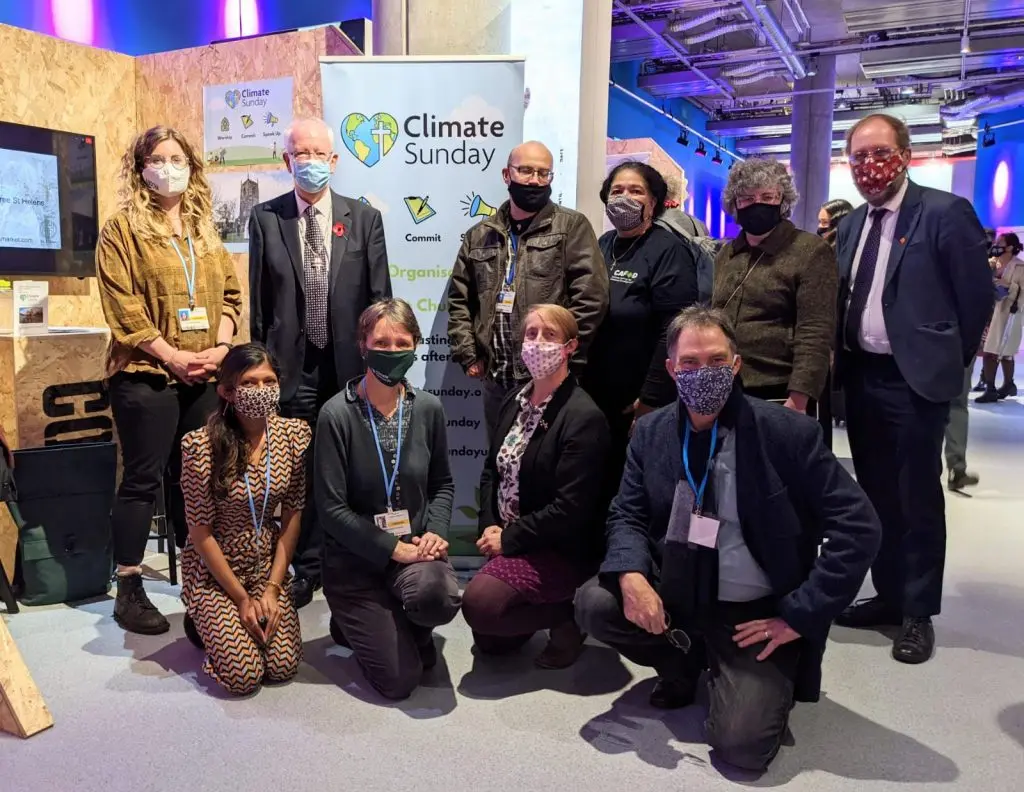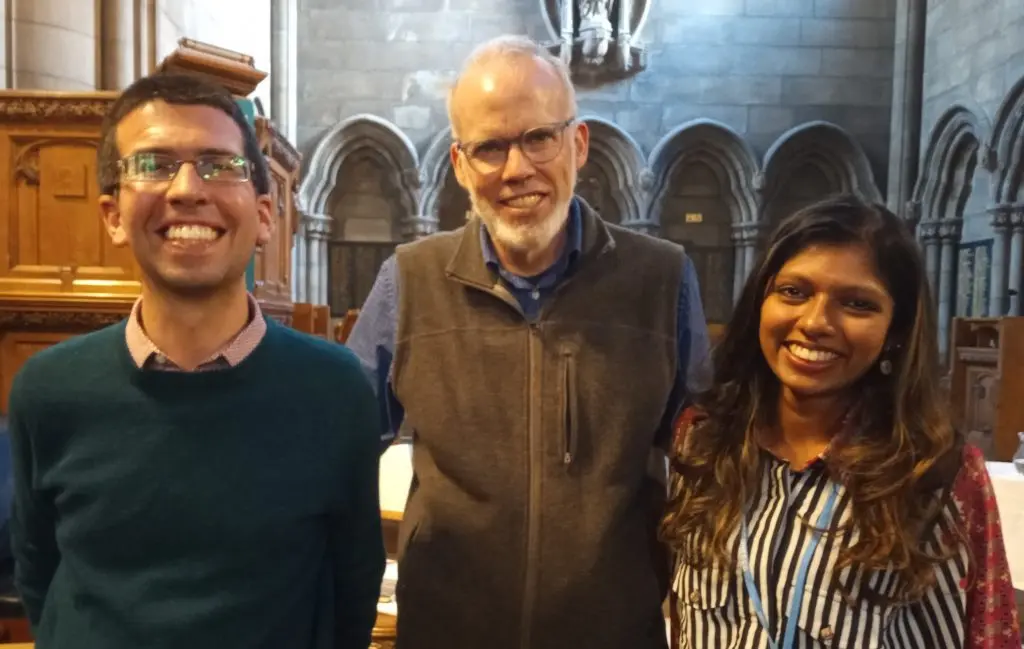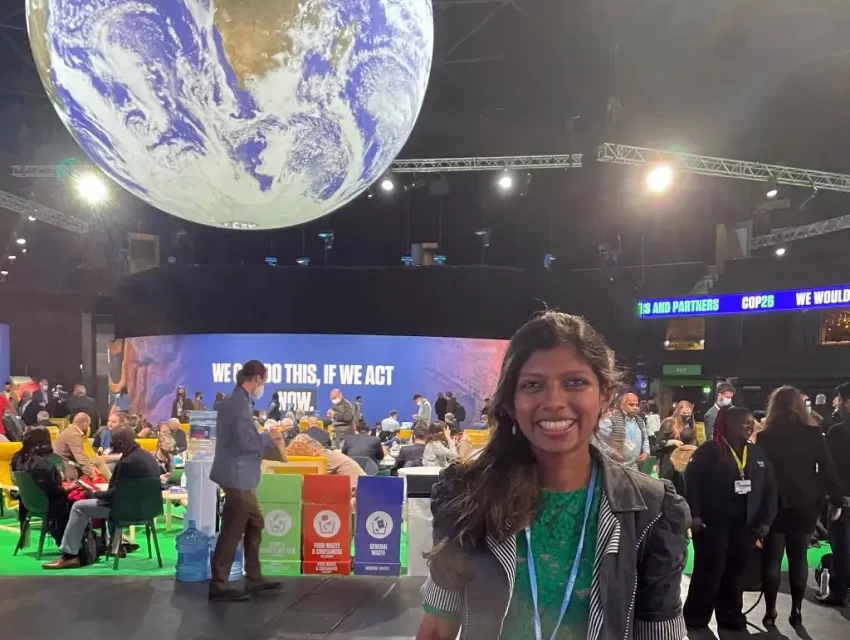Like many other climate activists from the UK and around the world, we spent several days in Glasgow during COP26, participating in events and praying and acting for climate justice, especially for the vulnerable communities most affected by the climate crisis here and now.
Shilpita spent a week in the Blue Zone (where official COP26 negotiations took place) with the Christian Climate Observer Program (CCOP), while James represented Operation Noah as a panellist at various events, spent time with a group of ‘Pilgrimage2Paris’ pilgrims and organised a webinar with faith partners from across the global divestment movement.
Life in the Blue Zone (Shilpita Mathews)
Climate change is a spiritual issue: My COP26 highlights included meeting former US Vice President Al Gore and his daughter Karenna Gore (Director of the Center for Earth Ethics at Union Theological Seminary in New York) as part of the Christian Climate Observer Program (CCOP). The Gores listened to our climate journeys, shared their experiences and gave advice on connecting faith with climate action. One thing that resonated between this and the talk by Bill Mckibben (see below) was the need for recognising the climate crisis as a moral, ethical and spiritual issue reflecting a crisis within our hearts, one that is manifested in environmental injustices.
Transition is inevitable, justice is not: This phrase resonated from negotiation rooms, to climate marches, to talks by campaigners, to CEO presentations. Despite this, COP26 was a microcosm of larger global injustices. In the Blue Zone, after shadowing the Renew our World campaign for a day, I saw first-hand the rejection indigenous communities received behind closed doors, or how representatives from developing countries were often excluded from discussions on topics most important to them, like loss and damage.
We need to build bridges during a time of crisis: It was very encouraging to spend time with Operation Noah partners at the COP26 Climate Sunday stall in the Green Zone, and to celebrate all of the successes to date. I was particularly inspired by ambitious ecumenical and interfaith climate action at COP26, which was on display at numerous events. In fact, if people of faith, who represent more than 80% of the world’s population, came together, a just transition to limit global average temperature rises to 1.5°C could become a reality.

Shilpita Mathews (front row, far left) with members of the Climate Sunday coalition: a group of over 30 Christian charities and most UK denominations.
Finding hope in the road ahead: This was my first COP, and what was most overwhelming for me was the polarisation between the Blue Zone, where negotiations took place, and the fringes of COP26. This is what Lorna Gold of the Laudato Si’ Movement and FaithInvest calls, ‘a tale of two COPs’. While there have been glimpses of hope, with various Blue Zone leaders meaningfully engaging and representing frontline communities, there is a long road ahead. But what gave me hope was the action across non-governmental communities, from the unity shown amongst faith communities, to commitments made by the private sector and academia, to go beyond what has been agreed.
For more of my reflections, you can watch the videos I made from the Blue Zone at COP26 on the Operation Noah Twitter and Facebook accounts.
On the fringes of COP26
(James Buchanan and Shilpita Mathews)
Some of the most encouraging and prophetic actions took place on the fringes of COP26. One major highlight was joining the final day of the Young Christian Climate Network (YCCN) Relay to COP26 and the closing service at St George’s Tron, in the centre of Glasgow.
It was an amazing achievement – the result of incredible commitment demonstrated by Christians aged 18-30 to organise the Relay to COP26 from the G7 in Cornwall in June to COP26 in Glasgow at the end of October.
We also had some excellent meetings, both planned and unexpected, with partners, campaigners and supporters, as well as old and new friends. Following a multi-faith vigil in George Square in the centre of Glasgow, we were delighted to meet Jonathan Wittenberg, Senior Rabbi of Masorti Judaism UK. We also met one of our heroes, Bill McKibben, who co-founded 350.org and initiated the fossil fuel divestment movement, as he delivered a lecture at the University of Glasgow.

James Buchanan and Shilpita Mathews with writer and activist Bill McKibben (centre), founder of the global divestment movement and of the environmental charity, 350.org.
Reflections on our COP26 event: Fossil Fuel Divestment, Climate Justice and a Just Transition for All
(James Buchanan)
Operation Noah’s main event at COP26 took place on Monday 8 November and was organised in partnership with Laudato Si’ Movement, Green Anglicans, World Council of Churches, GreenFaith, CAFOD, Christian Aid, Tearfund, SCIAF and Eco-congregation Scotland. The event was entitled, Fossil Fuel Divestment, Climate Justice and a Just Transition for All.
The panel of speakers included Lorna Gold (Chair of Laudato Si’ Movement), Mark Campanale (Founder and Executive Chair of Carbon Tracker), Rt Revd Olivia Graham (Bishop of Reading), Pastor Ray Minniecon (Australian indigenous Anglican pastor) and Sally Foster Fulton (Head of Christian Aid Scotland). I also joined the speaker panel.
The event included several inspiring and challenging contributions, especially from Pastor Ray Minniecon. Lorna Gold, Chair of Laudato Si’ Movement, wrote about the event: ‘Everyone should watch this – from start to end. Most honest and uncomfortable event I attended at COP26.’
COP26 conclusions: A missed opportunity, but scope to build momentum in 2022
The world needs to phase out of all types of fossil fuels: The outcomes of COP26 have been widely covered in the media, with much of the focus being on the last-minute proposal from India and China to ‘phase down’ rather than ‘phase out’ coal. Yet the world needs to phase out oil and gas too, not only coal – starting with the wealthiest nations that have contributed most to the climate crisis. Furthermore, the US and China had already agreed to the ‘phase down’ wording in a joint agreement issued days before.
There has been less attention given to the hugely disappointing announcement days before COP26 that the $100 billion in climate finance promised to developing countries would not be met until 2023, despite the wealthiest nations having pledged at the UN climate talks in Copenhagen in 2009 to meet the target by 2020. This is an abdication of moral responsibility and did little to build trust with nations most affected by the climate crisis. Many of these countries said that they would reluctantly sign the Glasgow Climate Pact, in spite of inadequate financing for loss and damage.
One of the most positive developments during COP26 was the launch of the Beyond Oil and Gas Alliance, an alliance launched by Denmark and Costa Rica to phase out oil and gas production. Among the countries to sign up were France, Ireland, Portugal and Sweden, as well as Wales, Quebec and Greenland. The group has committed to setting an end date for oil and gas extraction.
The time is now for Churches to divest from fossil fuels and invest in climate solutions
There has never been a more important time to call on UK Churches to divest from fossil fuel companies and invest in climate solutions, such as renewable energy. This will send a clear signal to our governments – here in the UK and around the world – about the urgent need to move beyond fossil fuels and rapidly cut emissions.
There are signs that the pressure is working. Just days after COP26, Nicola Sturgeon spoke out against the new Cambo oil field off the west coast of Scotland. The Cambo oil field, led by Shell and Siccar Point Energy, would lead to emissions equivalent to the annual carbon pollution from 18 coal-fired power stations. If the UK government is to act with integrity and retain any credibility following COP26, it must bring an immediate end to new oil and gas projects, starting with Cambo.
In 2022, Operation Noah’s Bright Now campaign will continue calling on UK Churches – including the Church of England, the Scottish Episcopal Church and Catholic and CofE dioceses – to join the vast majority of UK Churches in divesting from fossil fuel companies. We will continue our collaboration with partners around the world and seek to amplify voices from the global South, including indigenous communities, especially ahead of the Lambeth Conference that begins in July 2022.
Source
Image Source
Tags: COP26: A missed opportunity, Operation Noah



